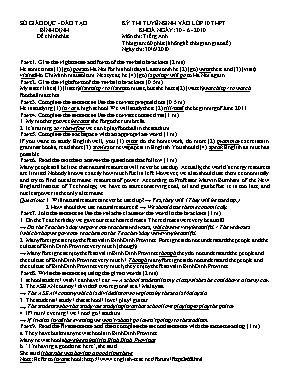Đề thi tuyển sinh vào Lớp 10 THPT môn Tiếng Anh năm 2010 - Sở GD & ĐT Bình Định
Bạn đang xem tài liệu "Đề thi tuyển sinh vào Lớp 10 THPT môn Tiếng Anh năm 2010 - Sở GD & ĐT Bình Định", để tải tài liệu gốc về máy bạn click vào nút DOWNLOAD ở trên

SỞ GIÁO DỤC - ĐÀO TẠO KỲ THI TUYỂN SINH VÀO LỚP 10 THPT BèNH ĐỊNH KHOÁ NGÀY: 30 - 6 - 2010 Đề chớnh thức Mụn thi: Tiếng Anh Thời gian: 60 phỳt (khụng kể thời gian giao đề) Ngày thi: 30/6/2010 Part 1. Give the right tense and form of the verbs in brackets. (2 ms) He sometimes (1) (go) goes to Ha Noi for his holidays. Last month he (2) (go) went there and (3) (visit) visited Ho Chi Minh mausoleum. Next year, he (4) (go) is going / will go to Ha Noi again. Part 2. Give the right form of the verbs in brackets. (0.5 m) My sister likes (1) (listen) listening / to listen to music, but she hates (2) (watch) watching / to watch football matches. Part 3. Complete the sentences. Use the correct prepositions. (0.5 m) He is studying (1) in / at a high school. We will study there (2) till/until the beginning of June 2011. Part 4. Complete the sentences. Use the correct connectives. (1 m) 1. My mother got wet because she forgot her umbrella. 2. It’s raining, so / therefore we can’t play football in the stadium. Part 5. Complete the each space with an appropriate word. (1 m) If you want to study English well, you (1) must do the homework, do more (2) grammar exercises in grammar books, read short (3) stories or newspapers in English. You should (4) speak English as much as possible. Part 6. Read the text then answer the questions that follow. (1 m) Many people still believe that natural resources will never be used up. Actually, the world’s energy resources are limited. Nobody knows exactly how much fuel is left. However, we also should use them economically and try to find out alternative resources of power. According to Professor Marvin Burnham of the New England Institute of Technology, we have to start conserving coal, oil and gas before it is too late; and nuclear power is the only alternative. Questions: 1. Will natural resources never be used up? đ Yes, they will. (They will be used up.) 2. How should we use natural resources? đ We should use them economically. Part 7. Join the sentences. Use the relative clause or the word in the brackets. (1 m) 1. On the Teacher’s day we gave our teachers red roses. The red roses were very beautiful. đ On the Teacher’s day we gave our teachers red roses, which were very beautiful. / The red roses (which/that) we gave our teachers on the Teacher’s day were very beautiful. 2. Many foreigners enjoy the festival in Binh Dinh Province. Foreigners do not understand the people and the culture of Binh Dinh Province very much. (though) đ Many foreigners enjoy the festival in Binh Dinh Province though they do not understand the people and the culture of Binh Dinh Province very much. / Though many foreigners do not understand the people and the culture of Binh Dinh Province very much, they enjoy the festival in Binh Dinh Province. Part 8. Write the sentences, using the given words. (2 ms) 1. school student / wish / can have / car. đ A school student (in my class) wishes he could have a (new) car. 2. The ASEAN country / divided / two regions / sea / Malaysia. đ The ASEAN country which is divided into two regions by the sea is Malaysia. 3. The students / study / that school / love / play / guitar. đ The students who/that study/are studying in/at that school love playing/to play the guitar. 4. If / rain / evening / we / not / go / stadium. đ If it rains in/all the evening, we won’t/shan’t go (aren’t going) to the stadium. Part 9. Read the first sentence and then complete the second sentence with the same meaning. (1 m) a. They have built many new schools in Binh Dinh Province. Many new schools have been built in Binh Dinh Province. b. “I’m having a good time here”, she said. She said (that) she was having a good time there. Note: Refer to in/at school:
Tài liệu đính kèm:
 de_thi_tuyen_sinh_vao_lop_10_thpt_mon_tieng_anh_nam_2010_so.doc
de_thi_tuyen_sinh_vao_lop_10_thpt_mon_tieng_anh_nam_2010_so.doc





